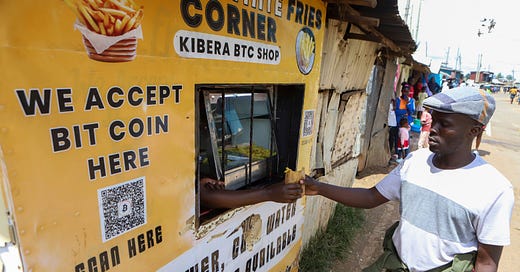🌯Inclusive FinTech Knowledge Bites [Week #69]
Bitcoin hopes and risks in Kenya’s slums. Mobile wallets are reshaping finance from the edge in. Learn to spot hidden churn traps in agent networks.
Hey,
I’m Hugo Pacheco, and this is The Barefoot Economist, a newsletter where, every week, I break down three essential stories on last-mile technology, emerging market innovation, and financial inclusion. Consider it your bite-sized takeaway to stay informed, sharp, insightful, and easy to digest.
This week on The Barefoot Economist:
🧨 Bitcoin in Kenya Slums: Decentralized Hope, Centralized Risk
🌍 Why Mobile Wallets Are Eating Finance from the Edge In
🔥 Churn Trap: Spotting Hidden Barriers in Agent Channels
Enjoy your reading!
🧨 Bitcoin in Kenya Slums: Decentralized Hope, Centralized Risk

A garbage collector in Nairobi’s largest slum now holds 80% of his net worth in Bitcoin. A few street vendors accept it. A local fintech is calling it “financial freedom”.
Let’s cut the noise.
This isn’t a revolution. It’s a live experiment. In a community where people survive on a dollar a day, Bitcoin is showing up not as a tech upgrade, but as a workaround to a broken system.
No banks. Mobile money is too expensive. ID barriers everywhere. So, crypto slips in through the cracks. Cheap. Fast. Unregulated.
The problem? The same thing that makes it accessible also makes it dangerous. No protections. No plan B. No safety net when things go sideways.
Let’s break this down without the hype. No jargon. No evangelism. Just strategy. Ready for the takeaways?
🌯 The Barefoot Insight
M-PESA’s too expensive. Banks are too exclusive. So here comes Bitcoin, no fees, no ID… and no safety net.
This is not scale. It’s a test200 people using Bitcoin in a 250,000+ person slum isn't financial inclusion. It’s a pilot with PR.
Bitcoin’s selling point here? It's not M-PESAUsers like it because it's faster, cheaper, and doesn’t need ID or fees. That’s not a crypto revolution, it’s an indictment of mobile money gatekeepers.
Volatility kills the pitch.Garbage collectors putting 80% of their net worth into Bitcoin isn’t innovation, it’s risk transfer from fintech founders to the poor. This isn’t financial freedom. It’s exposure.
Crypto education is essential but also a fig leafFinancial literacy doesn’t fix the fact that Bitcoin swings 20 %+ in a week. It just makes people feel better about gambling.
Infrastructure ≠ IdeologyBitcoin here is infrastructure. Not ideology. It’s a rail, not a religion. Treat it like that, and you’ll build something. Preach it, and you’ll burn trust.
No regulation means no guardrailsAfriBit calls this a benefit. Kassim calls it reckless. He’s right. When things go wrong, there’s no recourse, only regret.
🧩 Strategy gaps cost more than subscriptions.
You’re not here to collect newsletters; you’re here to win.
The paid tier gets you into the real conversations: unit-economics intel, cross-market business models, and founder-focused growth GTM plays.




